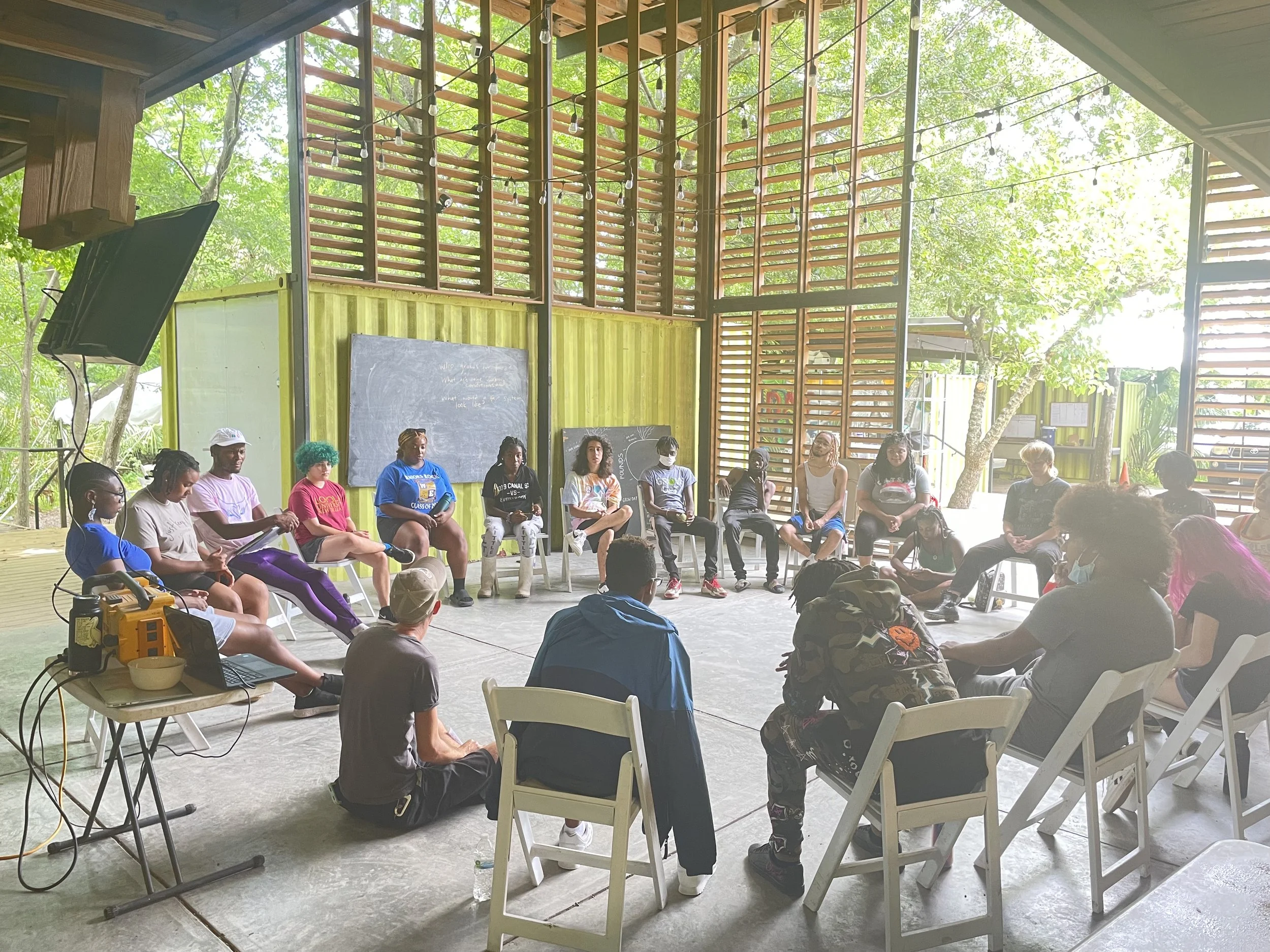
Looking Back, Looking Ahead
How do we understand the past to create a more just future?
Grow Dat is located on land known as Bulbancha, or ‘place of many languages’ in the Choctaw language. This land has been occupied and stewarded by the Houma, Chitimacha, Acolapissa, Ishak, Bayougoula, Natchez, Tunica-Biloxi, and Choctaw and other nations whose names are lost to us. We know that “settler colonialism is a structure, not an event,” and that land loss for Indigenous communities is ongoing, especially in coastal Louisiana. Resistance is ongoing too; Indigenous people are still here and their cultures are enduring. As we work to move into right relationship with each other and the Earth, we look to their teachings, especially in this moment of climate emergency.
European settlers stole this land by force from Indigenous nations and created a violent system of forced labor, the consequences of which endure today. In City Park, where Grow Dat is now located, there were once 14 different plantations on which enslaved people built canals to drain land; planted, harvested, and processed sugarcane in dehumanizing conditions; and endured denial of their basic human dignity. Through a partnership with University of New Orleans and Kalie Ann Rhodes, we have access to a list of people who were enslaved on this land. Their names – known and unknown – remind us of the countless histories not often told, including the rich history of resistance and struggle against such brutal conditions. We take particular inspiration from the example of Maroons, who escaped enslavement to build multi-ethnic communities in the swamps outside New Orleans.
After the formal abolition of slavery, plantation structures endured on this land in the form of segregation. Much of the construction of City Park, as we know it today, was done by people of color; yet the park remained a white-only space until 1958. Legal efforts led by A.P. Tureaud led to its integration only after the case reached the US Supreme Court. We draw inspiration from these organizing efforts as well as the community work done to create Crescent Star Park, as a way to celebrate people who have been oppressed uniting to meet their own needs in the face of exclusion.
Knowing this history, at Grow Dat, we ask ourselves: How do we draw on and be in cooperation with these legacies of community, creativity, and resistance to practice and promote equity on this land? How do we create and maintain an inclusive and equitable organization?
Firstly, we prioritize an honest, open, respectful, and diverse educational environment for our youth and staff. Addressing these traumatic histories, learning the stories of resistance, and imagining just futures is a central focus of our curriculum.
A space where these kinds of conversations are invited is essential. At Grow Dat, we are grounded in the VISIONS framework, which gives us both a shared language for understanding oppression and communication tools for addressing and interrupting it when it occurs. All youth in our leadership programs, and all adult staff, undergo this training yearly; its frameworks and practices are woven into our curriculum and shape our unique workplace culture.
Our History of the Land workshop is a centerpiece of our curriculum, which dives deeper into the themes cited above and asks young people and adult participants to consider what a just future of City Park could be. Rather than a one-time land acknowledgement, this workshop is an ongoing conversation that calls us to face our history, learn from the past, and imagine our future in diverse community. At least twice per year, we offer this workshop to the public. (Check our events page for upcoming workshops, or read the article about History of the Land here.)
Valuing labor in its various forms is a priority for us. This is why we have co-developed a compensation tool rooted in our values that respects different types of work, including that which has conventionally been devalued in our society (for example, physical labor and care work) as well as formal and informal educational experiences that shape how and why we work. In a similar fashion, on an annual basis, we collectively author and revise our personnel policies and benefits (for example, around types of paid leave and time off) to encourage wellbeing among all employees.
We create leadership pathways within the organization to ensure that a diversity of people end up in staff and management roles. Currently, we have one part-time and three full-time staff who are alumni of one of our leadership programs. By honoring the expertise of our program alumni and making space for them to lead, we interrupt a dynamic where those with more access to formal education end up in higher-paying positions with greater decision-making power.
This is work we must do together. Knowing the history of white-controlled decision making on this land, it is important to include a diversity of voices in our decision-making processes. To this end, we use a consensus model for organizational decision making that makes space for everyone’s different perspectives. In keeping with this journey, we've recently evolved our leadership structure from a single Executive Director model to Co-Executive Directors who are supported by staff committees. Similarly, we have recently added youth alumni to our board and are excited to move further in this direction. We have also moved toward including youth in big organizational decisions, as when youth employees participated as equal partners in our strategic planning process.
At Grow Dat, we look back to look ahead. We know that realizing equity and inclusion is an ongoing process of learning, unlearning, and reflection that depends on honest feedback and open conversation. That kind of communication is impossible without a culture of relationship and trust. We prioritize building and nurturing that culture at Grow Dat so we can learn together, try different approaches, and reflect with intention, as we step toward a future where self determination and belonging are woven into everything we do.
